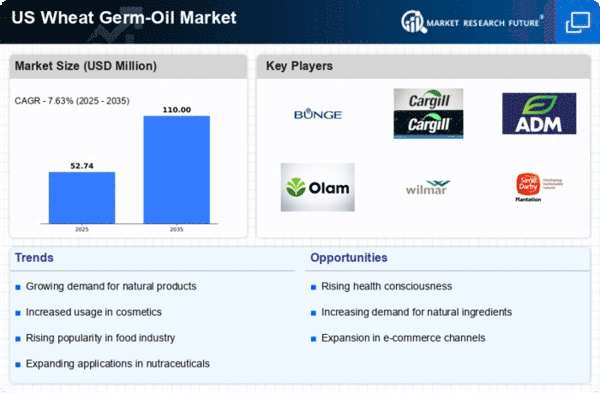Innovations in Food Processing
Innovations in food processing techniques are likely to enhance the utilization of wheat germ oil in various culinary applications. As food manufacturers explore new methods to incorporate healthy oils into their products, wheat germ oil is emerging as a versatile ingredient. Its unique flavor profile and nutritional benefits make it suitable for a range of applications, from salad dressings to baked goods. The US food industry is projected to grow at a CAGR of 3.5% through 2025, which may provide opportunities for wheat germ oil to penetrate new market segments. Additionally, advancements in extraction and refining processes could improve the quality and shelf life of wheat germ oil, further driving its adoption in the food sector.
Expansion of E-commerce Platforms
The expansion of e-commerce platforms is transforming the way consumers access products, including those in the wheat germ-oil market. Online shopping has become a preferred method for many consumers, particularly for health and wellness products. In 2025, e-commerce sales in the health and wellness sector are projected to surpass $100 billion in the US, highlighting the potential for wheat germ oil to reach a broader audience. This shift towards online purchasing may encourage manufacturers to enhance their digital marketing strategies and optimize their online presence. As consumers increasingly turn to e-commerce for convenience and variety, the wheat germ-oil market could see significant growth through enhanced accessibility and targeted marketing efforts.
Growing Interest in Functional Foods
The wheat germ-oil market is poised to benefit from increasing consumer interest in functional foods that provide health benefits beyond basic nutrition. As consumers become more health-conscious, they are actively seeking foods that can enhance their well-being. Wheat germ oil, with its high levels of nutrients and potential health benefits, aligns well with this trend. The functional food market in the US is expected to reach $275 billion by 2025, indicating a substantial opportunity for wheat germ oil to be integrated into various food products. This growing interest in functional foods suggests that manufacturers may increasingly incorporate wheat germ oil into their offerings to cater to health-oriented consumers.
Rising Demand for Natural Ingredients
The wheat germ-oil market experiences a notable increase in demand for natural and organic ingredients across various sectors, including food, cosmetics, and dietary supplements. Consumers are increasingly seeking products that are free from synthetic additives, which has led to a surge in the popularity of wheat germ oil due to its rich nutrient profile. In 2025, the market for natural personal care products in the US is projected to reach approximately $15 billion, indicating a robust growth trajectory. This trend is likely to bolster the wheat germ-oil market, as manufacturers incorporate it into formulations to meet consumer preferences for clean-label products. The emphasis on transparency in ingredient sourcing further enhances the appeal of wheat germ oil, positioning it as a preferred choice among health-conscious consumers.
Nutritional Benefits and Functional Properties
The wheat germ-oil market benefits from a rich nutritional profile. This includes high levels of vitamin E, essential fatty acids, and antioxidants. These attributes contribute to its appeal in the health and wellness sector, where consumers are increasingly aware of the importance of nutrition in their diets. The oil is often marketed for its potential health benefits, such as promoting heart health and improving skin conditions. In 2025, the dietary supplement market in the US is expected to exceed $50 billion, with a growing segment focused on natural oils and extracts. This trend suggests that wheat germ oil could capture a significant share of this expanding market, as consumers seek out products that offer both health benefits and functional properties.
















